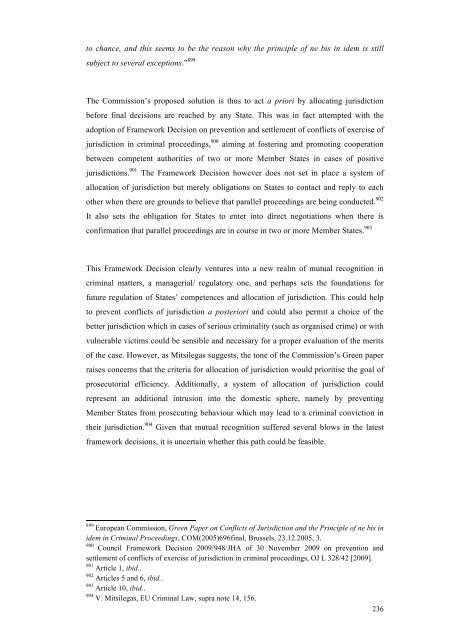The evolution of European Union criminal law (1957-2012)
The evolution of European Union criminal law (1957-2012)
The evolution of European Union criminal law (1957-2012)
You also want an ePaper? Increase the reach of your titles
YUMPU automatically turns print PDFs into web optimized ePapers that Google loves.
to chance, and this seems to be the reason why the principle <strong>of</strong> ne bis in idem is still<br />
subject to several exceptions.” 899<br />
<strong>The</strong> Commission’s proposed solution is thus to act a priori by allocating jurisdiction<br />
before final decisions are reached by any State. This was in fact attempted with the<br />
adoption <strong>of</strong> Framework Decision on prevention and settlement <strong>of</strong> conflicts <strong>of</strong> exercise <strong>of</strong><br />
jurisdiction in <strong>criminal</strong> proceedings, 900 aiming at fostering and promoting cooperation<br />
between competent authorities <strong>of</strong> two or more Member States in cases <strong>of</strong> positive<br />
jurisdictions. 901 <strong>The</strong> Framework Decision however does not set in place a system <strong>of</strong><br />
allocation <strong>of</strong> jurisdiction but merely obligations on States to contact and reply to each<br />
other when there are grounds to believe that parallel proceedings are being conducted. 902<br />
It also sets the obligation for States to enter into direct negotiations when there is<br />
confirmation that parallel proceedings are in course in two or more Member States. 903<br />
This Framework Decision clearly ventures into a new realm <strong>of</strong> mutual recognition in<br />
<strong>criminal</strong> matters, a managerial/ regulatory one, and perhaps sets the foundations for<br />
future regulation <strong>of</strong> States’ competences and allocation <strong>of</strong> jurisdiction. This could help<br />
to prevent conflicts <strong>of</strong> jurisdiction a posteriori and could also permit a choice <strong>of</strong> the<br />
better jurisdiction which in cases <strong>of</strong> serious <strong>criminal</strong>ity (such as organised crime) or with<br />
vulnerable victims could be sensible and necessary for a proper evaluation <strong>of</strong> the merits<br />
<strong>of</strong> the case. However, as Mitsilegas suggests, the tone <strong>of</strong> the Commission’s Green paper<br />
raises concerns that the criteria for allocation <strong>of</strong> jurisdiction would prioritise the goal <strong>of</strong><br />
prosecutorial efficiency. Additionally, a system <strong>of</strong> allocation <strong>of</strong> jurisdiction could<br />
represent an additional intrusion into the domestic sphere, namely by preventing<br />
Member States from prosecuting behaviour which may lead to a <strong>criminal</strong> conviction in<br />
their jurisdiction. 904 Given that mutual recognition suffered several blows in the latest<br />
framework decisions, it is uncertain whether this path could be feasible.<br />
899 <strong>European</strong> Commission, Green Paper on Conflicts <strong>of</strong> Jurisdiction and the Principle <strong>of</strong> ne bis in<br />
idem in Criminal Proceedings, COM(2005)696final, Brussels, 23.12.2005, 3.<br />
900 Council Framework Decision 2009/948/JHA <strong>of</strong> 30 November 2009 on prevention and<br />
settlement <strong>of</strong> conflicts <strong>of</strong> exercise <strong>of</strong> jurisdiction in <strong>criminal</strong> proceedings, OJ L 328/42 [2009].<br />
901 Article 1, ibid..<br />
902 Articles 5 and 6, ibid..<br />
903 Article 10, ibid..<br />
904 V. Mitsilegas, EU Criminal Law, supra note 14, 156.<br />
236
















